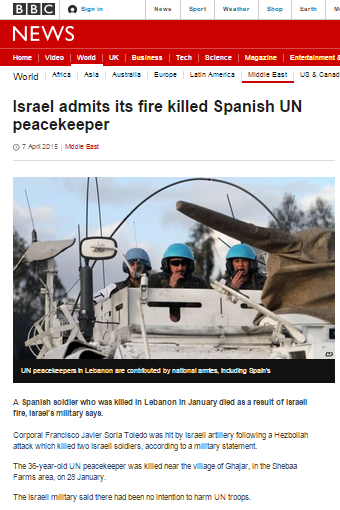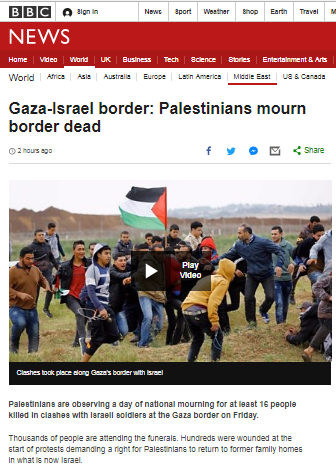It’s a story BBC audiences have heard many times before but on December 8th two more reports produced by the BBC Jerusalem Bureau’s Yolande Knell continued the now well established tradition of context-free descriptions of damage to structures resulting from the summer conflict in the Gaza Strip as a means of amplification of the campaign by Hamas and its sympathisers to lift restrictions on dual-use goods into the territory, to which the corporation – and Knell in particular – self-conscripted back in July.
Listeners to BBC World Service radio heard an item titled “Slow reconstruction of Gaza” which was also promoted as a podcast on Twitter. The synopsis to that podcast reads as follows: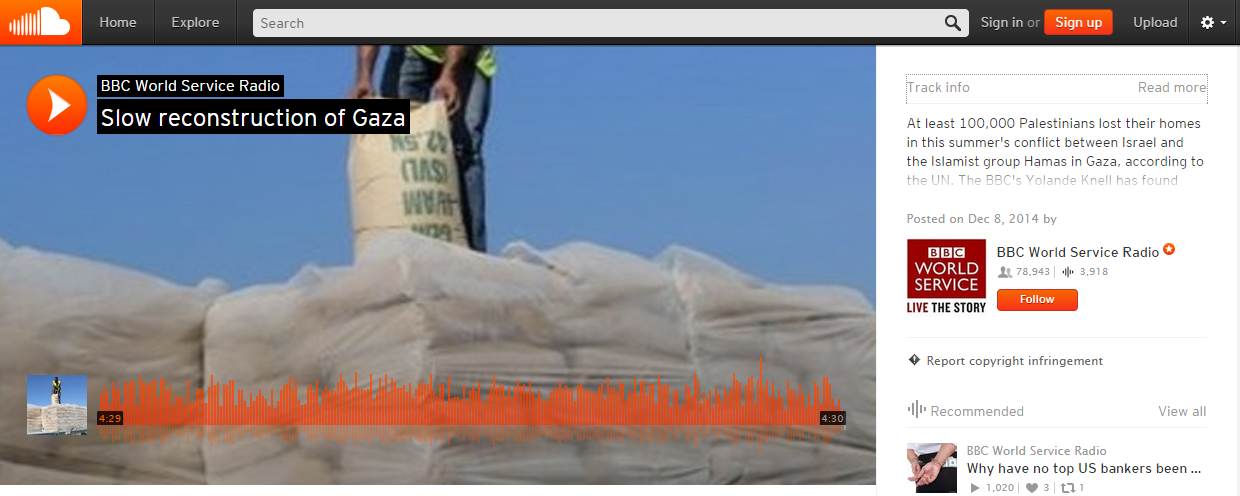
“At least 100,000 Palestinians lost their homes in this summer’s conflict between Israel and the Islamist group Hamas in Gaza, according to the UN. The BBC’s Yolande Knell has found that very little reconstruction has taken place in this Palestinian territory. Israel tightly monitors the import of building materials and equipment into Gaza, arguing that militants could use them to rebuild tunnels and carry out attacks.”
As has been noted here previously, the BBC has shown no interest whatsoever in investigating how Hamas managed (despite supposed supervision by international bodies and aid agencies) to comandeer thousands of tons of construction materials in order to build the dozens of cross-border attack tunnels which led to the ground operation in this summer’s conflict. Instead, what has already been shown to be reality continues to be represented by the BBC as theoretical Israeli claims.
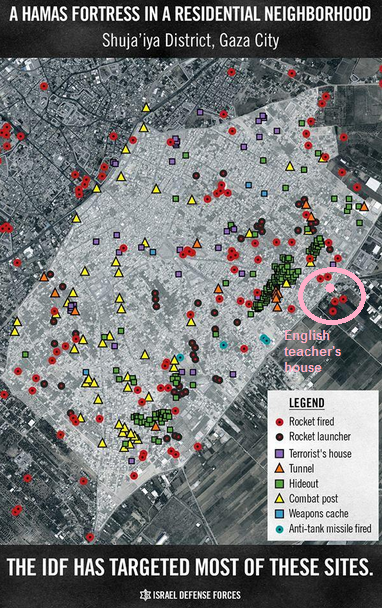
Knell opens her audio report with a visit to Shuja’iya – the neighbourhood also featured in her big report last September. Once again, she refrains from informing listeners of the scale of Hamas operations in that neighbourhood which caused parts of it to become military targets, or specifically that the street highlighted in her report is near the location of missile launching sites used by the terrorists during the summer war.
“Three months on from the ceasefire that ended this summer’s fighting in Gaza, I’ve come back to Nazaz Street in one of the worst affected neighbourhoods – Shuja’iya. It’s much colder than last time I was here and some areas are flooded because there’s been really wet, wintry weather in the past week. But otherwise, surprisingly little has changed: there is still rubble everywhere.
[Man’s voice] See – this is the kitchen. Our cups…destroyed here.
Knell: I’ve met up once again with Abdul Kareem Abu Ahmed. An English teacher, he shows me around the ruins of his large home and rose garden.
AKAA: We were hoping that they will immediately rebuild our houses. But after three months we feel now very frustrated.
Knell: Have you had any progress with the United Nations coming to look at the house?
AKAA: Yes, they came here. They visit us, they took photos. They promised us they will give us money to pay for renting flat but nothing happened. They didn’t give us concrete. They didn’t give us equipments to rebuild, so we still as we were.”
The same Brontë-loving, rose-growing English teacher has of course already appeared in a succession of BBC reports – see examples here, here and here. Regular listeners to BBC World Service radio were no doubt confused by the next segment of Knell’s report seeing as just days earlier they had been told that there are no building materials (or electricity or water) in the Gaza Strip.
“Knell: But here at the Burj al Jamil [phonetic] building firm we’ve finally found some signs of progress. There’s a big crowd of men around the office door. They’re getting their ID cards checked against names on a computerized system. Then they get given a coupon which they hand over here at the warehouse. There’s a forklift truck loading up cement into the back of a horse and cart. Now, there are security cameras all around this warehouse so that monitors can keep an eye on what’s happening to these bags of cement. This company had to get special clearance to import the building materials into Gaza.
[Man’s voice] If the system stays like this it will take at least ten years to rebuild Gaza.
Knell: And yet the manager, Sami Abu Obeid, is disheartened. He tells me he could easily distribute much more cement.
Manager: Instead of 160 tons a day coming in, make it six or seven thousand tons. Also send in more gravel and iron. I will guarantee that everyone gets the right amount. Give me the names and I’ll take responsibility.”
Again, Knell makes no effort to inform listeners how the previous system of supervision failed to prevent cement, gravel and iron from reaching Hamas. She continues, describing the half year-old Palestinian unity government as “new” and failing to clarify to BBC audiences that Robert Serry’s decidedly cryptic message actually means that – as has been obvious for some time – that ‘unity government’ is not capable of solving the problems facing the population of Gaza Strip.
“The UN special coordinator Robert Serry was just in Cairo for more talks on Gaza. He secured the current arrangements to work around Israel’s blockade – tracking goods to make sure they don’t fall into militants’ hands. The new Palestinian unity government is supposed to oversee reconstruction. But Mr Serry admits there have been a lot of hold-ups.
Serry: I understand the frustrations in Gaza: that it has taken time and that it is still not really working at the required scale. To be successful, we need a government of national consensus to be empowered there. They don’t even control the crossings yet. We still have a very fragile ceasefire and then that’s why I’m worried because I also know that the consequences of failure can be that a next conflict is around the corner. Nobody wants that.
Knell: So for now, people in Gaza face an uncertain future and a long wait to rebuild their homes. For many of those I’ve been revisiting here, life is simply miserable. I’ve come into the Habeeb family house in Shuja’iya. There’s lots of water on the stairs as I go up. There’s still the whole exterior wall that’s missing from the last conflict – it was blown away – and you have more than 20 members of the family living here in just two rooms.
When it rains it’s a disaster. It’s like we have waterfalls coming through the roof and all the children are soaked, says Um al Ez [phonetic]. We just use blankets to keep warm. What else can we do?
And as her grandchildren play football in the next room, their warm breath misting up the cold air, there’s no easy answer.”
Of course had the Palestinian unity government fulfilled its existing obligation to disarm terrorist groups in the Gaza Strip when it first came into being, Knell might be telling a very different story now.
Knell’s second report from December 8th was a filmed item promoted on BBC television news as well as on the BBC News website under the title “Gaza struggling to rebuild after conflict“. The synopsis to the report includes the following statement, once again failing to clarify that the use of construction materials imported into the Gaza Strip for the purposes of terrorism is not theoretical.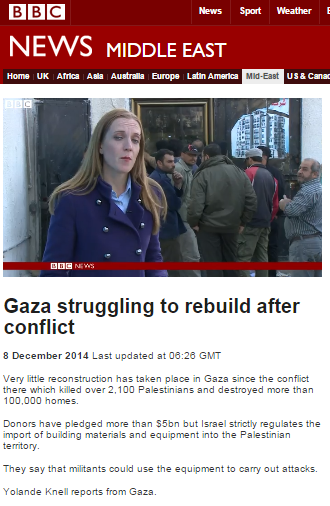
“Very little reconstruction has taken place in Gaza since the conflict there which killed over 2,100 Palestinians and destroyed more than 100,000 homes.
Donors have pledged more than $5bn but Israel strictly regulates the import of building materials and equipment into the Palestinian territory.
They say that militants could use the equipment to carry out attacks.”
In that report audiences once again heard from the BBC’s favourite English teacher and from the manager of the building supplies warehouse. They were also informed by Knell that:
“A deal brokered by the UN works around Israel’s blockade of Gaza.”
“Israel wants guarantees militants won’t take these goods to rebuild tunnels they can use for cross-border attacks.”
She goes on to introduce an interview with UNRWA’s director of operations in the Gaza Strip.
Knell: “The huge sale of destruction means it’s taking longer than expected to assess the damage. UN officials also blame Palestinian politics for delays in reconstruction and say ultimately Israel needs to lift its tight border restrictions. Their efforts can only achieve so much.
Robert Turner: The mechanism is a significant step. It’s important to ensure that the families that were affected by the conflict can rebuild their homes. It’s not a replacement for the lifting of the blockade. If there’s going to be peace and security, if there’s going to be stable Gaza, then the blockade needs to be lifted.”
This of course is not the first time that BBC audiences have heard ostensibly ‘neutral’ UNRWA officials promoting the Hamas demand to lift border restrictions designed to prevent it from rearming and acquiring dual-use goods for the purposes of terrorism: a step which Turner apparently bizarrely believes would bring “peace and security”. In October of this year, listeners to the BBC World Service heard Turner’s colleague – the former BBC correspondent with a direct line to the BBC’s Middle East editor, Chris Gunness – say of the UN’s supervision of building materials:
“But let’s be clear: this mechanism is not a substitute for lifting the blockade.”
Neither is there anything new about the fact that UNRWA’s political campaigning dovetails with the agenda of the internationally recognised terrorist organization which took control of the Gaza Strip in a violent coup and the BBC’s collaboration in amplifying it. Yolande Knell was to be found doing exactly that long before the last conflict.
“But a spokesman for the UN agency for Palestinian refugees Chris Gunness says that ultimately, the precarious situation in Gaza is created by seven years of tight border restrictions imposed by Israel and Egypt.”
And:
“Unrwa spokesman Chris Gunness said […] “While Unrwa understands the frustration of the population, heightened by the tightened blockade on the Gaza Strip, and respects the right to peaceful demonstrations, Unrwa must ensure the safety and security of its staff.” ” [emphasis added]
Of course were the BBC to actually get around to providing an accurate and impartial representation of when and why those border restrictions had to be imposed in the first place, audiences would be able to judge UNRWA’s political campaigning – and the BBC-supplied free PR – for what it really is. Instead, the BBC continues to uncritically quote UNRWA, obviously with no journalistic curiosity as to why the ‘human rights’ organisation’s agenda is indistinguishable from that of an Islamist terror group.


